

September 9th, 2014. Here is How to Make Sense of Conflicting Startup Advice. Everybody has a blog these days and there is much advice to be had.
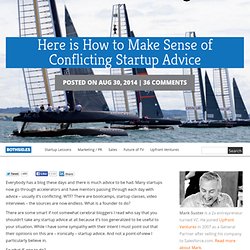
Many startups now go through accelerators and have mentors passing through each day with advice – usually it’s conflicting. WTF? There are bootcamps, startup classes, video interviews – the sources are now endless. Learning Without Logic. After Napster was shut down in 2001, the brand was reborn in 2003 as a subscription online-music service run by Roxio’s Chris Gorog.
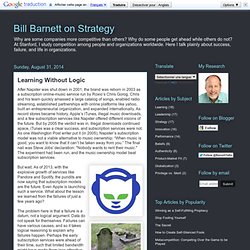
Chris and his team quickly amassed a large catalog of songs, enabled radio streaming, established partnerships with online platforms like yahoo, built an entrepreneurial organization, and expanded internationally. As record stores became history, Apple’s iTunes, illegal music downloads, and a few subscription services like Napster offered different visions of the future. But by 2005 the verdict was in. Illegal downloads continued apace, iTunes was a clear success, and subscription services were not. As one Washington Post writer put it (in 2005), Napster’s subscription model was not a viable alternative to music ownership: “When music is good, you want to know that it can’t be taken away from you.” But wait. The problem here is that a failure is a datum, not a logical argument. The result? Rarely say yes to feature requests - Inside Intercom. Here’s a simple set of Yes/No questions that you can quickly answer before you add another item to your product roadmap.

Saying yes to a feature request – whether it’s a to an existing customer, a product enquiry, a teammate, or a manager – is immediately rewarding. It’s an unspoken transaction where you barter long term product focus in exchange for short term satisfaction. Losing my Amazon Religion. Benedict Evans asks a good question: The growth curve is impressive enough, even before you notice that the scale is logarithmic.
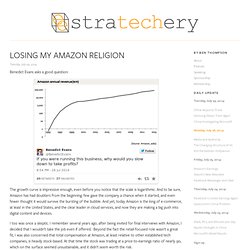
And to be sure, Amazon has had doubters from the beginning: few gave the company a chance when it started, and even fewer thought it would survive the bursting of the bubble. And yet, today Amazon is the king of e-commerce, at least in the United States, and the clear leader in cloud services, and now they are making a big push into digital content and devices. I too was once a skeptic. I remember several years ago, after being invited for final interviews with Amazon, I decided that I wouldn’t take the job even if offered.1 Beyond the fact the retail-focused role wasn’t a great fit, I was also concerned that total compensation at Amazon, at least relative to other established tech companies, is heavily stock-based. As of today, the stock price has doubled.
Amazon is constantly creating new business lines. So what exactly is going on? “It’s pretty difficult to solve big problems in four years” Larry Page: When I talk to most companies, I do think their leaders are pretty short-term focused.
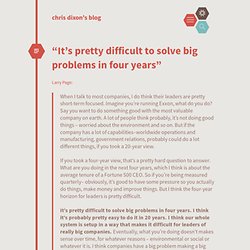
Imagine you’re running Exxon, what do you do? Say you want to do something good with the most valuable company on earth. A lot of people think probably, it’s not doing good things – worried about the environment and so on. Working smarter. Usually I go to sleep not knowing what feature or bug I'm going to work on the next day.
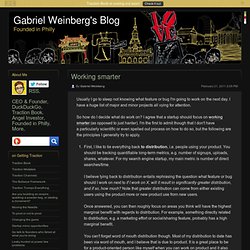
I have a huge list of major and minor projects all vying for attention. So how do I decide what do work on? I agree that a startup should focus on working smarter (as opposed to just harder). I'm the first to admit though that I don't have a particularly scientific or even spelled out process on how to do so, but the following are the principles I generally try to apply. First, I like to tie everything back to distribution, i.e. people using your product. Despite the above, my process breaks down from time to time around the edges. Who You Gonna Call? Navigating the Existential Crisis. This series of posts starts off with a short quiz for the startup CEO: Q: Who’s responsible for developing your product?
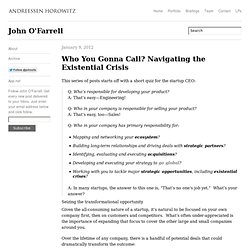
A: That’s easy—Engineering! Q: Who in your company is responsible for selling your product? A: That’s easy, too—Sales! Q: Who in your company has primary responsibility for:Mapping and networking your ecosystem? Seizing the transformational opportunity Given the all-consuming nature of a startup, it’s natural to be focused on your own company first, then on customers and competitors. Over the lifetime of any company, there is a handful of potential deals that could dramatically transform the outcome: Although every company theoretically has access to transformational opportunities, few actually manage to identify them, let alone seize them.